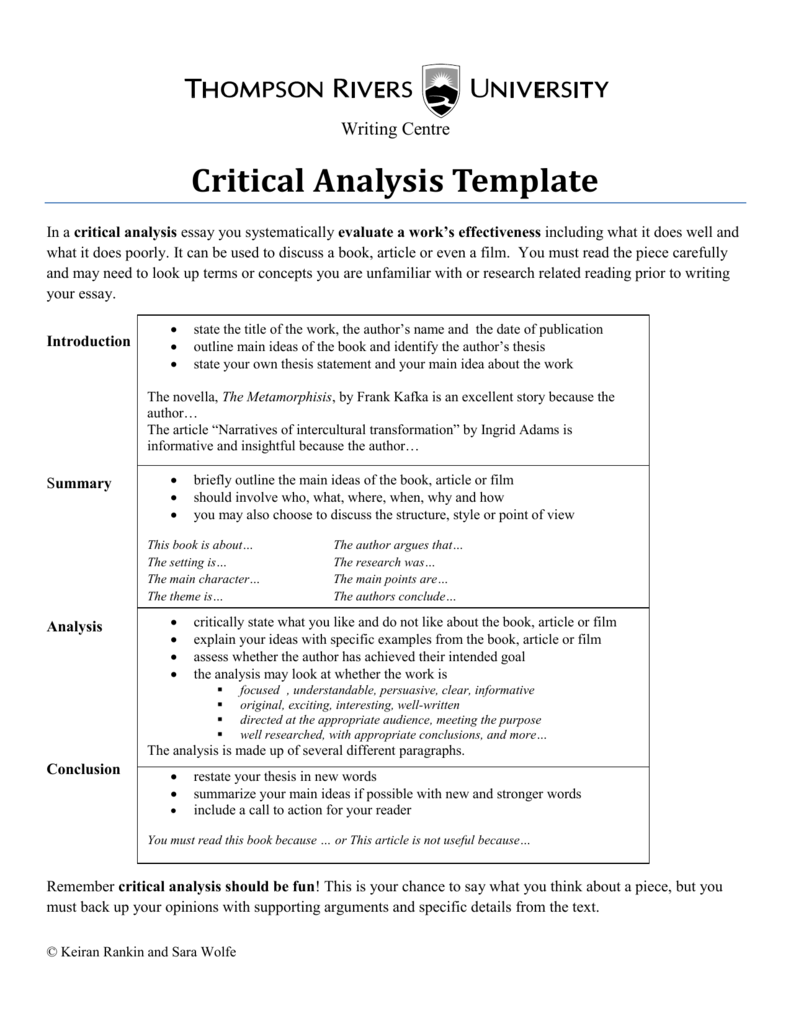
Briefly summarise the range, contents, and arguments of both the texts picking up the main themes only. This section should not normally take up more than a third of the total review. Critically discuss key issues raised in the texts. This section is the core of your review 7/4/ · The body of the review should: state your arguments in support of your thesis. follow the logical development of ideas that you mapped out in your outline. include quotations from the article which illustrate your main ideas. The concluding paragraph may: summarize your review. restate your thesis critical points from 1. Restate the purpose of the article/ book. 2. Using your critique as a base, make a judgment about how successful author has been in achieving their blogger.com blogger.come your own response to the article that has been reviewed from the blogger.coms? 4. Comment on whether or not the makes a useful contribution to the
Critical review - ANU
View our latest COVID updates. Critical reviews require how to write a critical review of a research article planning and drafting just like any other assignment. This guide suggests what to focus on at each stage of the process. Close Notification Close Notification Close Notification. Skip to content Skip to navigation, how to write a critical review of a research article.
You are here: Home Quick study guides Writing a critical review Writing a critical review Skip to Text version Download PDF PDF, 0. Text version Writing a critical review Critical reviews require careful planning and drafting just like any other assignment. Plan your approach Read your assignment instructions carefully in order to: determine your exact criteria; find out what proportion of your review you should dedicate to summary and evaluation; and know whether the summary and evaluation should be presented as separate sections or a combined section.
Evaluate the text Judge the quality or value of the text for other researchers, or to practitioners in the field, or to students. Consider the merits of the text in the short term as well as the long term. Consider the merits of the text in comparison to other related text. When evaluating the text you could answer some of the following questions: Is the question the text tries to answer relevant, interesting, new, or useful?
To who, and why? Does the text give new answers or interpretations to an old question? Is the text detailed, or brief? Simple or complex? Is the evidence presented to support the answer extensive? Are the conclusions reached final, limited, qualified or preliminary? Write it up When writing and proofreading your critical review: Stay focused on your evaluation criteria. Read the text you are reviewing again to check that you have covered everything.
How to Critique a Research Article
, time: 42:31Briefly summarise the range, contents, and arguments of both the texts picking up the main themes only. This section should not normally take up more than a third of the total review. Critically discuss key issues raised in the texts. This section is the core of your review 7/4/ · The body of the review should: state your arguments in support of your thesis. follow the logical development of ideas that you mapped out in your outline. include quotations from the article which illustrate your main ideas. The concluding paragraph may: summarize your review. restate your thesis critical points from 1. Restate the purpose of the article/ book. 2. Using your critique as a base, make a judgment about how successful author has been in achieving their blogger.com blogger.come your own response to the article that has been reviewed from the blogger.coms? 4. Comment on whether or not the makes a useful contribution to the
No comments:
Post a Comment